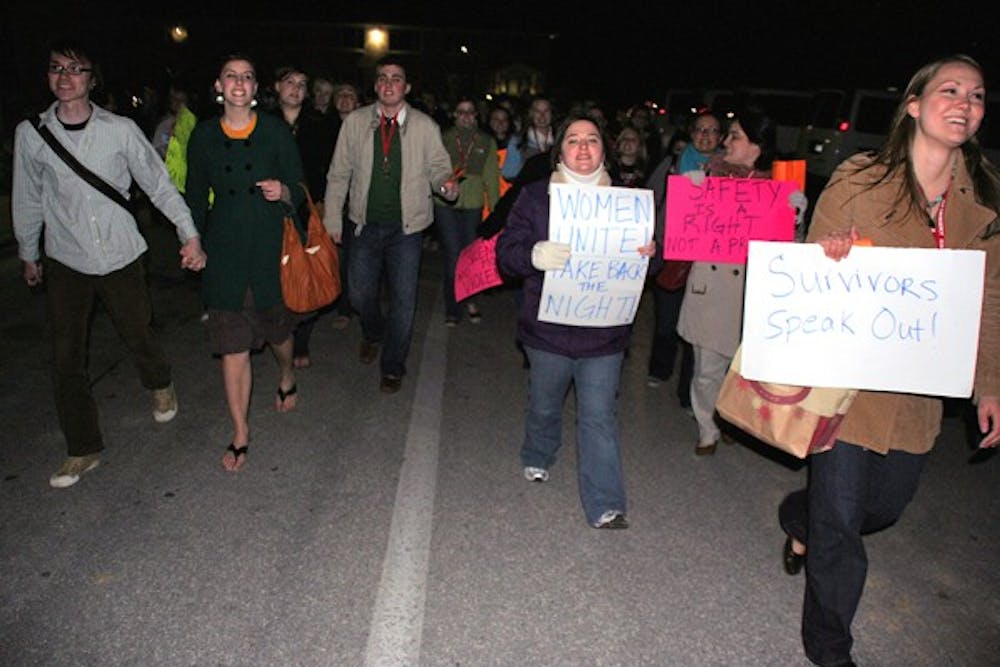Correction Appended
Last week, a proposal was submitted to Vice President of Campus Life Gail Hanson that would add definitions for terms involving sexual assault in the Student Conduct Code, such as “stalking” and “consent,” and would differentiate between the charges students receive for different types of sexual assault.
The proposal, entitled “Sexual Assault and Misconduct Procedures for Students,” was written, reviewed and submitted by the policies subgroup of the Sexual Assault Working Group, a group of AU students, faculty and staff working to improve the university’s approach to sexual assault, according Sarah Brown, director of Women’s Initiative.
In their recent letter to the editor, Hanson and Provost Scott Bass alluded to the proposal, calling it “an enhanced statement of rights, responsibilities and resources related to sexual misconduct.”
The proposal is under “active review” and approval is expected before the semester ends, according to Hanson and Bass’ letter. The full text of the document will be released to The Eagle and published when it is approved.
The amendment makes demarcations between the charges for different types of sexual assault that would appear on students’ records from the Office of Student Conduct. It differentiates between sexual assault, sexual harassment and harassment and intimidation, according to Deputy Director of the Student Advocacy Center Julie Mills. Mills sits on the Sexual Assault Working Group representing the Student Advocacy Center.
Currently, all records on a student disciplinary record for sexual assault are the same.
“You could have fondled somebody and you could have raped somebody, and at the end of the day, you would end up with the same charge,” Mills said. “Your sanctions would be different. That’s all taken into consideration. But that is what would go on a disciplinary record.”
The policy also clarifies what constitutes consent, which is currently defined in the Conduct Code as “words or conduct indicating a freely given agreement to have sexual intercourse or to participate in sexual activities.”
The Conduct Code goes on to indicate what does not constitute consent.
“Sexual contact will be considered ‘without consent’ if no clear consent, verbal or nonverbal, is given; if inflicted through force, threat of force, or coercion; or if inflicted upon a person who is unconscious or who otherwise reasonably appears to be without the mental or physical capacity to consent,” the Code currently reads.
Mills said the amendment to the Code will describe different scenarios that are often mistaken for “implied consent.”
“For example, if you accept to go on a date with someone, that does not give you consent to accept any sexual activity,” Mills said. “Whatever you’re wearing does not imply consent.”
Campus groups that have reviewed the proposal include the Main Sexual Assault Working Group, the Department of Public Safety and members of the Conduct Advisory Board Committee. The CABC includes the Residence Hall Association, the Graduate Leadership Council and students in the Student Government.
“We tried to incorporate as many groups as possible so that what we’re submitting now ... answers everyone’s questions,” Mills said.
Kyrie McCauley-Bannar and Jennifer Dorsey are co-directors of the Stop Violence Against Women department of Women’s Initiative.
McCauley-Bannar and Dorsey said that consent can take many forms.
“Sometimes a person may feel so intimidated by a situation that they can’t say ‘no,’” Dorsey said. “But they make it very clear with their body language ... that they’re saying ‘no.’”
McCauley-Bannar said she thinks the definition of consent should focus on not just what means “no,” but also what means “yes.”
“Just out of respect for each other, [partners] need to wait for that confirmation,” she said.
Lastly, the proposed amendment looks to go further into specifying students’ rights and the responsibilities that the university has in providing resources to make students feel safe after incidents of sexual assault.
Work on the proposal began in the fall 2009 semester and it is hoped that the proposal will be approved in time to be implemented this fall, according to Mills.
Eagle staff writer Stefanie Dazio contributed to this report.
You can reach this staff writer at mfowler@theeagleonline.com.
An earlier version of this story identified Kyrie McCauley-Bannar and Jennifer Dorsey as sitting on the Policies subgroup of the Sexual Assault Working Group as WI representatives. Sarah Brown, WI's director, is the organization's representative. An earlier version also omitted a word from one of Julie Mills' statements. The correct statement appears there now. The Eagle regrets these errors.





